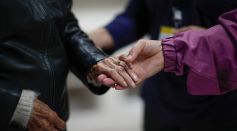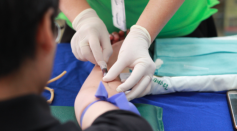Tags: Alzheimer's Disease
Women’s Brains Hold Clues as to Why Females Are More Vulnerable to Anxiety Disorder, Alzheimer’s Disease

Gut Bacteria Linked to Neurodegenerative Disease, Research Says
Novel Gene Therapy Seen to Preserve Memory, Learning Functions in Alzheimer’s Disease Patients

Odd Aspirin Effect May Provide Protection Against Air Pollution, Research Shows
![Science Times - 6 Hours or Less of Sleep May Cause One to Develop Dementia Later in Life [Study]](https://d.sciencetimes.com/en/full/33169/science-times-6-hours-less-sleep-may-cause-one-develop-dementia-later-life-study.jpg?w=237&h=131&f=3e0cf9a9fed4187f8509d8d53a23bfe9)
Sleeping Less Than 6 Hours a Night? Study Says It May Cause Dementia Later in Life

Brushing Teeth and Dementia Link Identified, Researchers Say It’s Oral Bacteria
Recent Study Shows Link Between Alzheimer's Disease and Major Surgery
Is Dementia Fatal?

Living in a Noisy Neighborhood May Cause Alzheimer's Disease, According to Recent Study

Fructose Intake Could Trigger Alzheimer's Disease
Scientists Find Biomarker of Degenerative Diseases in the Eye

Bill Gates Sr., Lawyer and Father of Microsoft Co-Founder, Dies at 94
Neurologists Are Treating Alzheimer's Disease by Sending Electrical Currents Deep in the Brain

The Importance of Blood Tests for Alzheimer's Disease Patients: 2 Neuroscientists Explain the Recent Findings

A Promising Blood Test May Diagnose Alzheimer's Disease

Living Alone in Your 50s and 60s? Dementia Found to Be 30% More Likely: Study

Salmonella in the Gut May Cause Neurological Diseases Like Parkinson’s

A Suppressor Gene is Found to Protect the Brain from Alzheimer's Disease

Non-Alcoholic Fatty Liver Disease is Causing Alzheimer's Disease, Medical Research Says
Women Who Went to School Longer Have Lower Risk of Dementia: New Study
Most Popular

The Strongest Tornadoes Ever Recorded: Scientific Breakdown of Extreme Tornado Events

Can Scientists Predict Earthquakes? The Latest Advances in Seismic Forecasting Explained

How Space Affects the Human Body: Key Health Challenges Impacting the Astronauts

Photosynthesis Made Easy: Light Reactions, Calvin Cycle, and Everyday Examples





